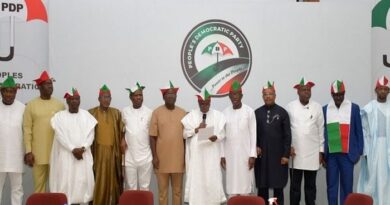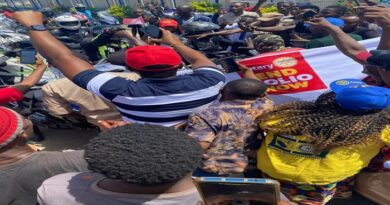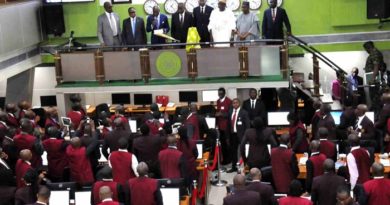INEC says elections postponement not politically influenced
- Believes there is need for more appreciation of the commission
The Independent National Electoral Commission (INEC) on Saturday said its decision to postponed the general elections a few hours to the commencement was not politically influenced.
“The decision (to postpone the election) has nothing to do with security, nothing to do with political influence and nothing to do with lack of resources,” INEC chairman Mahmoud Yakubu said at a press conference in Abuja.
The postponement heightens the political tensions in the country, especially between the ruling All Progressives Congress (APC) and the main opposition People’s Democratic Party (PDP).
The two parties have accused INEC of taking the decision to postpone the election based on political influence exerted by either party.
PDP and APC have been inundating the media with attacks on INEC’s decision to reschedule the presidential and National Assembly elections which have been billed to hold on February 23 while the governorship and state houses of assembly elections will take place on March 9.
Also, PDP presidential candidate Atiku Abubakar believed that the postponement was aimed at disenfranchising the people’s civic right and democracy of the country.
Incumbent president Muhammadu Buhari also said he was not responsible for the postponement of the election.
Buhari questioned why INEC would continue to assure the electorates of its readiness to conduct the elections when it was not ready. He added that the federal government had provided INEC with all resources and funding needed to carry commence the electoral process.
“I am deeply disappointed that despite the long notice given and our preparations both locally and internationally, the Independent National Electoral Commission (INEC) postponed the Presidential and National Assembly elections within hours of its commencement,” Buhari said in a statement on Saturday.
However, INEC chairman Yakubu said logistics challenge was responsible for the postponement.
“Following a careful review of the implementation of its logistics and operational plan, and the determination to conduct free, fair, and credible elections, the commission came to the conclusion that proceeding with the elections as scheduled is no longer feasible,” Yakubu said while postponing the election.
The INEC boss said the commission was constitutionally empowered to postpone an election when it realises hindrances of any type.
He stated that the shortage of logistics in all 774 local governments in the country does not make the commencement of the election feasible.
Speaking further, the chairman of the Commission says it is unfortunate that Nigerians do not appreciate the efforts of the commission.
Yakubu said between 2015 November when he took over INEC and now, the commission had been able to undertake 195 off-season elections which were successful.
Yakubu said ahead of the postponed elections, the electoral umpire was able to register 14 million new voters, print 421.7 million of ballot papers and 14.28 million Permanent Voter Cards in record time as well as mobilise over one million ad hoc workers which would undertake the elections.
The INEC boss, however, said Nigerians had failed to see these achievements.
Yakubu added, “It is often not appreciated the magnitude of activities that the Commission undertakes during general elections. Not only have we recruited and trained about one million young people to serve as ad hoc staff, but the magnitude of materials mobilised for our elections is also enormous.
“For instance, the commission has printed 421.7 million ballot papers for six scheduled elections, as well as 13.6 million leaves of result forms for the Presidential election alone.
“Indeed, managing 91 political parties and 23,316 candidates for whom votes will be cast in 119,973 polling units by over 84 million voters is certainly astounding. No doubt, preparations for the 2019 general elections have been extremely tasking for the commission.
“It is therefore not unexpected that such a tremendous national mobilisation of men and materials will encounter operational challenges and we have had our own fair share of such challenges. There had been delays in delivering ballot papers and result sheets for the elections which are not unusual.
“However, one must emphasise that all the ballot papers and result sheets were ready before the elections despite the very tight legal timeframe for finalising nomination of candidates and dealing with the spate of legal challenges that accompany it. In this regard, the commission has been sued or joined in over 640 court cases.”




